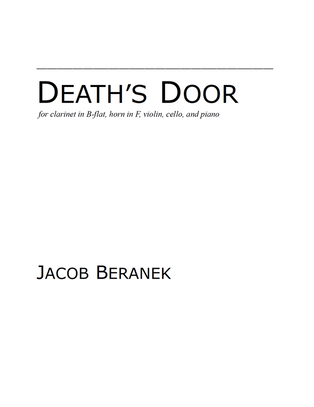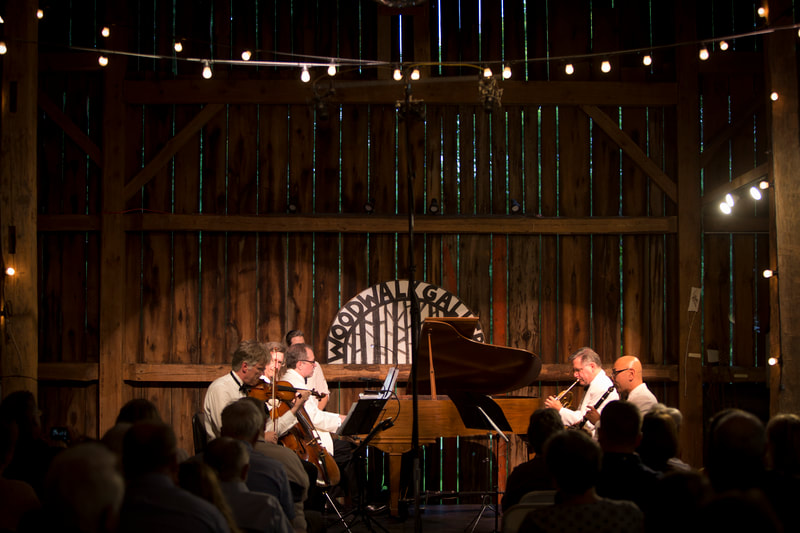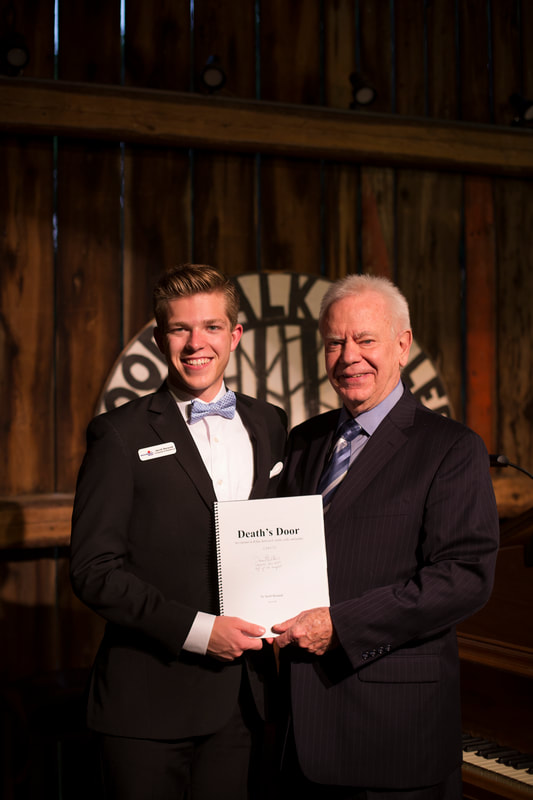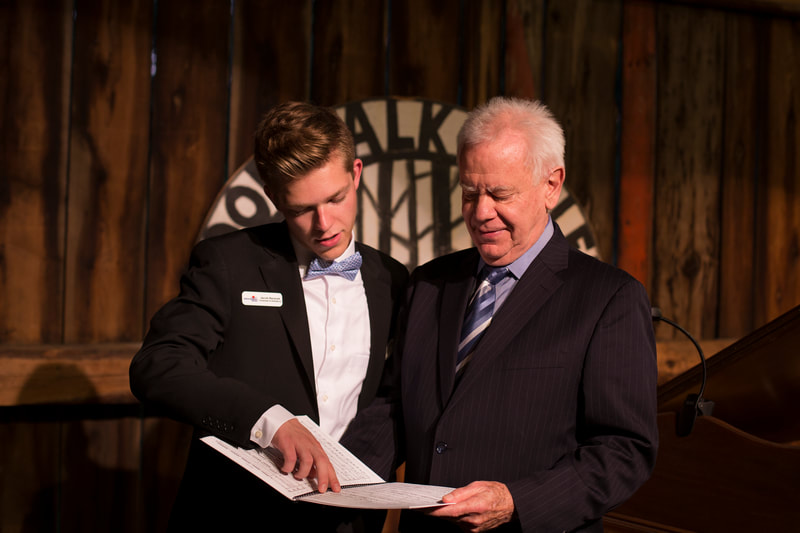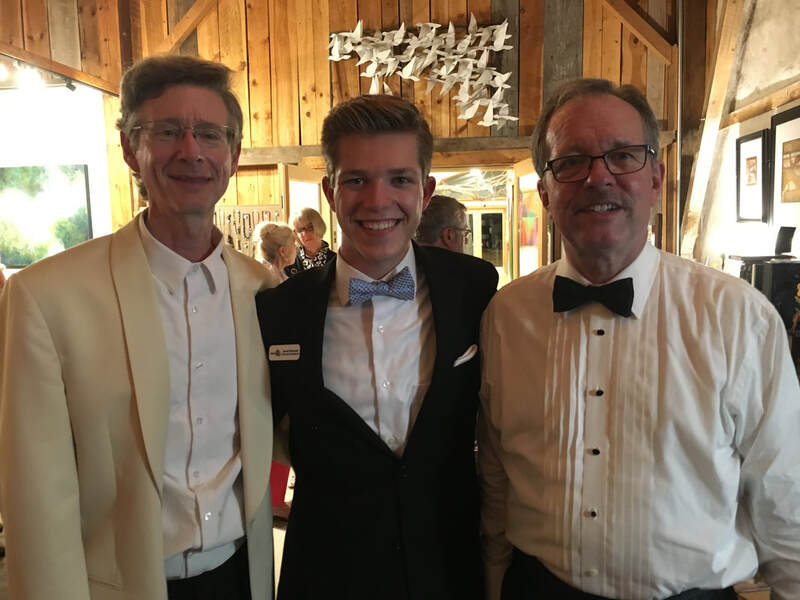DEATH'S DOOR (2017)
clarinet, horn, violin, cello, bass
clarinet, horn, violin, cello, bass
|
Score & Parts (digital download): $20.00
Score Only (digital download): $15.00 Score & Parts (hard copy): $40.00 + shipping Score Only (hard copy): $20.00 + shipping |
PROGRAM NOTES
I have always been captivated by the mystical tales surrounding the Porte des morts, or in English, “the Door of Death.” This narrow strait lies between Green Bay and Lake Michigan, directly at the tip of the Door Peninsula (which takes its name from the same body of water). Over the course of recorded history, the Porte des morts has claimed over 250 vessels, with some experts claiming the location boasts more shipwrecks than any other stretch of fresh water in the world. Ironically, though, not a single life has ever been lost as a result of a wreck amidst these treacherous shoals—the foreboding moniker actually originates from a legendary Native American battle. As I plunged deeper into this vivid history, I was inspired to write a poem, also entitled Death’s Door (below). From this text, I based my musical composition.
This quintet embodies a journey through time marked by three distinct sections, with each section being derived from a line in my poem. After the plaintive, opening clarinet solo (which represents the original native inhabitants of the area), the first major section of the composition commences in accordance with the line “disclosing tales of eons long-expired.” This section is a narrative in and of itself, weaving through forgotten centuries with music that ebbs and flows. After an eery, fluid transition, the second section erupts with a jaunty jig (“when schooners, barks, and brigs arose”). Here, there is a glimpse of a reckless crew of sailors as they test the limits of the Porte des morts—and the water wins. As their ship sinks, the music capsizes with it, splintering and shuddering until finally succumbing to the turbulent waves. The final section (“while upon these ancient gales I muse”) emerges from this cacophony, evolving from an echo of the opening clarinet solo. The piece builds to a triumphant conclusion, corresponding with the reassurance found in the final lines of my poem: “So, why find respite in this hostile setting? Simply that amid such death, I live.”
—Jacob Beranek
DEATH'S DOOR (2016)
by Jacob Beranek
I have always been captivated by the mystical tales surrounding the Porte des morts, or in English, “the Door of Death.” This narrow strait lies between Green Bay and Lake Michigan, directly at the tip of the Door Peninsula (which takes its name from the same body of water). Over the course of recorded history, the Porte des morts has claimed over 250 vessels, with some experts claiming the location boasts more shipwrecks than any other stretch of fresh water in the world. Ironically, though, not a single life has ever been lost as a result of a wreck amidst these treacherous shoals—the foreboding moniker actually originates from a legendary Native American battle. As I plunged deeper into this vivid history, I was inspired to write a poem, also entitled Death’s Door (below). From this text, I based my musical composition.
This quintet embodies a journey through time marked by three distinct sections, with each section being derived from a line in my poem. After the plaintive, opening clarinet solo (which represents the original native inhabitants of the area), the first major section of the composition commences in accordance with the line “disclosing tales of eons long-expired.” This section is a narrative in and of itself, weaving through forgotten centuries with music that ebbs and flows. After an eery, fluid transition, the second section erupts with a jaunty jig (“when schooners, barks, and brigs arose”). Here, there is a glimpse of a reckless crew of sailors as they test the limits of the Porte des morts—and the water wins. As their ship sinks, the music capsizes with it, splintering and shuddering until finally succumbing to the turbulent waves. The final section (“while upon these ancient gales I muse”) emerges from this cacophony, evolving from an echo of the opening clarinet solo. The piece builds to a triumphant conclusion, corresponding with the reassurance found in the final lines of my poem: “So, why find respite in this hostile setting? Simply that amid such death, I live.”
—Jacob Beranek
DEATH'S DOOR (2016)
by Jacob Beranek
|
Like shards of well-hewn glass
trampled underfoot, shells crunch, their decaying stench emitting, amidst craggled trees and lulling waves. Crisp air mingles with weathered stone, disclosing tales of eons long-expired:* of Potawatomi and of Winnebago, this sharp wind’s breath recalls. And, on these pulverized stones where seagulls and valiant Frenchmen alike have trod, this serene spot bears treacherous moniker. Rightly so, though tranquil may it seem: where speckled gulls bob as buoys once was, as in Pharaoh’s time, stained crimson in wake of Natives’ clash. In trailing centuries, this crusade was memorialized in name only; newfangled events usurped legend when schooners, barks, and brigs arose.* These seafaring vessels did christen the label Porte des morts, as Nichols, Forest, and Gilmore’s memories were sacrificed on its wicked shoals. In their distress, though by Pilot redeemed, living members not one did add a single droplet of mariner-blood to the previous libation decanted. |
Still, while upon these ancient gales I muse*
and gaze ’cross the yawning pale-blue expanse, from alluring mirage the foundered wrecks in their murky depths, shorn on shallows, call. Here I find that to breathe deeply is to sin against this gorish land’s end and to challenge those distraught who waded these perilous shores. Behemoth I feel. Unavailing sand tries to drag me downward; amused, I overpower it, lest I join the ranks of dead. It’s in this small triumph, I feel God’s kind hand: recall that we were made in Their likeness, not only to rule over sea’s fish and sky’s birds, but also to commune and partake in Nature’s full bounty. That to fulfill this is to achieve Adam’s first intention, I have no doubt. So, why find respite in this hostile setting? Simply that amid such death, I live. |

